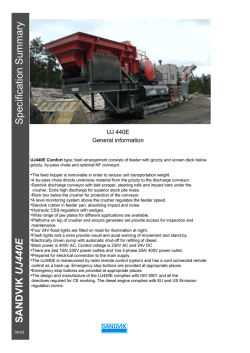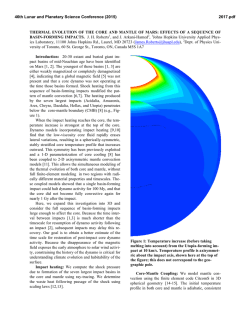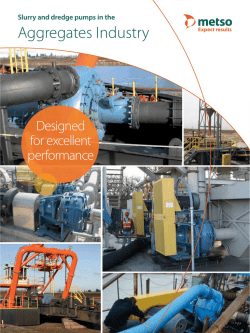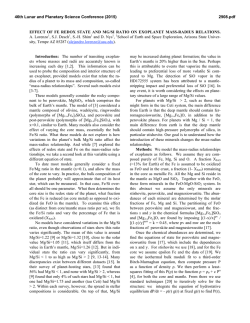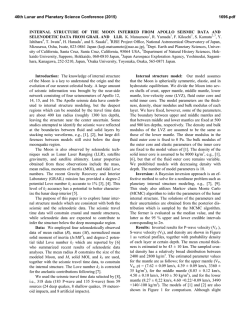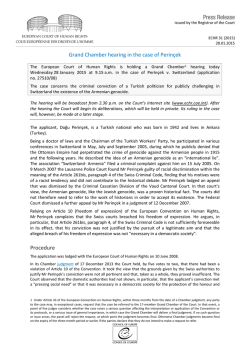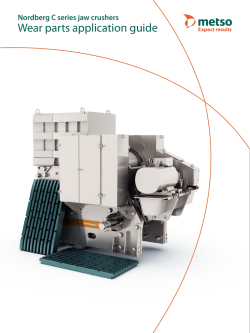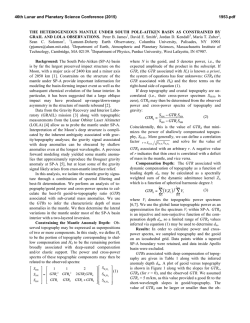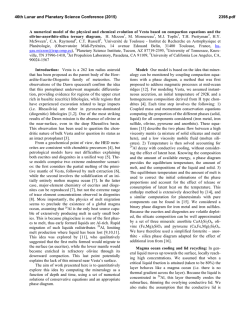
Primary Superior gyratory crushers
Expect results Metso’s Mining and Construction Technology SUBJECT TO ALTERATION WITHOUT PRIOR NOTICE. BROCHURE NO. 2761-06-12-SBL/TAMPERE- ENGLISH ©2012 METSO Expect results is our promise to our customers and the essence of our strategy. It is the attitude we share globally. Our business is to deliver results to our customers, to help them reach their goals. Primary SUPERIOR® gyratory crushers Wear parts application guide Wear parts application guide - SUPERIOR® gyratory crusher Gyratory crusher and basic concepts The SUPERIOR® gyratory crusher is a compressive style crusher for primary-stage applications. Its steep crushing chamber and long crushing surfaces provide exceptionally high capacity and long liner life. A gyratory crusher consists of a concave surface and a conical head; both surfaces are typically lined with manganese steel. The top of the shaft attached to the crushing cone is supported centrally in the bushings, and the bottom of the shaft is positioned in an eccentric bushing. The feed material is crushed between the fixed concave surface and a movable mantle. The bigger rock material is crushed against the mantle and the concave. The crushing action is caused by the closing of the gap between the moving mantle liner mounted on the central vertical shaft and the fixed concave liners mounted in the top shell of the crusher. The gap is opened and closed by an eccentric assembly in the bottom shell, which causes the central vertical shaft to gyrate. The vertical shaft is free to rotate about its own axis. Gyratory crushers are one of the main primary crusher types used in mines and quar2 ries. The size designation of gyratory crushers is based on the size of the feed opening and the mantle diameter. Main features • Steep crushing chamber and long crushing surfaces for exceptionally high capacity and maximum liner life • Extra heavy-duty frame, integral largediameter mainshaft assembly, and high performance bearing arrangement provide long life and reliable operation • Accurate crushing chamber design for optimized production • Dual counterbalance design minimizes the dynamic forces transmitted to the supporting structure • Large-diameter mainshaft upper journal with threaded, replaceable alloy steel sleeve • Hydraulically operated and controlled mainshaft positioning system for quick and effective adjustment of the mainshaft to compensate for liner wear • Easy maintenance and service Spider CAP Spider ARM shield Spider RIM liners Top shell assembly Mainshaft assembly Pinionshaft assembly Eccentric assembly Mainshaft positioning system assembly Current model sizes Recognized as the world leader, Metso Mining and Construction Technology offers the complete range of primary gyratory crushers to meet all application requirement. Machine size* Feed opening mm (in ) Mantle diameter mm (in) 42-65 1065 (42) 1650 (65) 50-65 1270 (50) 1650 (65) 54-75 1370 (54) 1905 (75) 62-75 1575 (62) 1905 (75) 60-89 1525 (60) 2260 (89) 60-110 1525 (60) 2795 (110) Open side setting The superior gyratory crusher’s discharge setting is referred to as the Open Side Setting (OSS). This is a single pre-determined setting at which the crusher and it’s crushing chamber are designed to operate. The setting cannot be operationally changed to produce different product sizes instead the setting change is made by modifying the bottom tier of the concave. *1st number = feed opening in inches, 2nd number = mantle diameter in inches Spider design Metso’s primary gyratory crusher range includes 4 basic head sizes (65”, 75”, 89” and 110”), in addition to which the Super Spider upgrade provides two additional larger feed openings. The patented U-shaped spider arms (currently available on the 60-110E) reduce twisting during crushing. Arched spider arms create a less restricted feed opening to reduce material bridging. C.S.S Mainshaft positioning system The mainshaft position system is a hydraulic method of vertical adjustment to compensate wear. It consists of a pump, controlled by a push-button, and a heavy-duty hydraulic cylinder that supports and adjusts the position of mainshaft assembly. • In lowest position with a new mantle and new concaves, there is about 1” (25mm) of oil under the piston • In highest position the minimum distance between the head nut and the spider is 1” (25mm) The mainshaft positioning system is only used to compensate mantle and concave wear, not to change the crusher setting. The Superior Gyratory Crusher is designed for one setting only with a given set of concaves. O.S.S O.S.S. - C.S.S. = Eccentric throw 3 How to operate a gyratory crusher Operating a Gyratory Crusher within its design parameters reaps huge benefits for the enduser, most notably, maximum crusher online availability, lowest possible maintenance repair costs, improved productivity and maximized crusher life span. In order to achieve these benefits, the following should be considered: 1. Always start the crusher correctly • Verify that the tank oil temperature is between 86°F (30°C) and 90°F (32°C) • Start the lube pump and circulate the oil • Start the crusher drive motor and allow the crusher to come to full speed • Run the crusher with no load (empty) until the return oil temperature is above 65°F (18°C) • Start feeding the crusher 2. Ensure proper pinionshaft speed • If the pinionshaft speed is much below the recommended RPM, the crushing performance can be adversely affected and can cause the crusher to stall • If the pinionshaft speed is much above the recommended RPM, the crusher bal4 ance and lube oil cooling can be adversely affected 3. Monitor no-load head spin • In most cases, no-load head spin will be 20 RPM or less. An excessively worn spider bushing can cause high no-load head spin • Monitor head spin at normal oil temperature. Normal oil temperature is in the range of 100ºF (38ºC) to 115ºF (46ºC) with ISO VG 68 EP2 oil or 100°F (38°C) to 130°F (54°C) with ISO VG 150 EP4 oil 4. Operate within the design limits • Volume limit: Each crushing chamber (mantle and concaves) has a volume limit which determines maximum throughput. A full crushing chamber is operating at its volumetric limit • Do not exceed the maximum feed size. Attempting to crush oversize feed material wastes time and reduces crusher capacity. The maximum feed size should be less than 80 – 85% of the nominal feed opening. This size distribution helps prevent blockage at the spider opening and allows a well-filled crushing chamber that will evenly distribute the crushing forces • Power limit: Power consumption will vary based on the crushing chamber used and the eccentric throw: increased throw = increased power draw. The power limit is exceeded if the crusher drive motor draws more power than it is rated for (the attached power must be compatible with the actual throw being used in the crusher). 5. Keep the overloading frequency to a minimum Overloads affect productivity and crusher reliability. Overloads can be caused by: • Tramp material (steel, wood, plastic, rubber, etc.) • High moisture content of the feed material • Sticky feed materials • Crusher set too tight for conditions • Improper feed arrangement to the crusher • Crusher fitted with the wrong style of mantle and concaves Note: For new installations the chamber performance and wear profile must be determined for the target application in order to ensure optimal material choices and develop the most economical customer solution. Changes in ore size and ore properties also affect chamber performance so a system survey aimed at developing an optimal chamber solution may be required. 5 SUPERIOR® chamber The crushing chamber, also known as the crusher cavity, is composed of a mantle and concave segments. The Superior crushing chamber is designed for a specific open side setting (OSS) which is tailored for each individual application. The concave profiles are designed taking into account the optimal combination of nip angle, power draw, crushing force and capacity requirements. The required product output size is achieved with the design of the lower tier concaves (O.S.S). A reduced throw eccentric can be supplied to reduce crusher throughput and therefore allow a full chamber to be maintained which will produce a more consistent product with less oversize material. The objective is to maximize crusher productivity and to achieve best possible wear material performance. The unique SUPERIOR crushing chamber concept provides: • Even wear • Greater product uniformity • Better distribution of wear throughout the chamber – fewer service problems and lower operating cost • Fewer liner changes – less wear costs per product ton • Improved energy efficiency 6 High abrasion resistance concaves • Single or double tier concaves available in a variety of alloys • Secured manufacturing / casting / heat treatment process • Easy to fit. Special concaves are preassembled before delivery and equipped with v-groove for thickness monitoring and predictive maintenance. • Cost effective. Extended wear life and application-specific liners • No maintenance, no gouging • No swelling – growth. Reduced downtime • Reduced risk of fall out with locking system. Conical pins or lock bars V-groove Backing material The backing material fills the void between the concaves and shells or the mantle and head to provide a solid assembly. Metso offers WF Ultra Performance backing material for long-lasting and secure installation. Examples of single tier (left) and double tier (center) chambers. Chamber segment thickness (right) varies depending on the application. Concave segments MIDDLE CHAMBER LINERS (MID) XT510 / XT525 XT610 / XT710 Low-alloy steel, High-chrome special ●● ●●● ●●● ●● ●● ●●● ●●● ●● ●● ●●● ●●● ●● C C C C C C ●● ●●● ●● ●●● ●● ●●● ●●● ●● ●● ●●● ●●● ●● C C C C C C ● ●● ●●● ●● ● ●● ●●● ●● C ●●● C s liner er in take Upp rs Easy and non abrasive r line Easy and abrasive BOTTOM CHAMBER LINERS (BTM) ● ●●● XT510 / XT525 ●● ●● XT710 / XT810 Low-alloy steel, ●●● (C) C High-chrome special ● Can be used ●● Good choice ●●● Recommended C - Contact Metso representative for more information ●●● Bottom tier high wear resistant liners XT510 / XT525 XT610 / XT710 Low-alloy steel, High-chrome special Difficult and Difficult and Medium and Medium and abrasive non abrasive abrasive non abrasive Midd UPPER INTAKE LINERS (TOP) Upper Intake Liners • Manganese alloys • Low-alloy steel, impact resistant Chamber Mid Liners • High manganese alloys • Low-alloy steel, abrasion and impact resistant Chamber Bottom Liners • Low-alloy- steel, high abrasion and impact resistant • High-chrome special, maximum abrasion resistance amb e Metso’s standard concave alloy is manganese, but depending on the feed characteristics a variety of other alloys can be chosen to achieve best cost per produced ton. The upper concave tiers must withstand high impact forces. The lower tiers require maximum abrasion resistance le ch Material selection Definitions for different rock types are presented in Wear and materials application guide, page 4. 7 Mantle options Different alloys, designs and sectioned mantles can be selected to achieve the best cost per produced ton, depending on the application and the wear rate. Choosing the correct mantle is always an application-specific process. The following mantle designs are available or will be designed to meet the customer’s process requirements: • 1, 2 and 3 piece • Smooth, partially corrugated, fully corrugated • Undersize, standard, oversize #1, #2 • Matched mantles, RBD #1 and #2 • Special application-specific designs Model 1 Piece 2 Piece 3 Piece 42-65 50-65 54-75 62-75 60-89 60-110 Standard Optional Standard Optional Optional Optional Standard Optional Standard Standard Standard Optional Optional Approximate weight of shaft ( complete assembly ) 42-65 50-65 54-75 62-75 60-89 60-110 8 51 000 lbs. (23 130 kg.) 62 000 lbs. (28 120 kg.) 85 000 lbs. (38 560 kg.) 93 000 lbs. (42 180 kg.) 146 000 lbs. (66 220 kg.) 226 160 lbs. (102 585 kg.) Mantle size For each primary gyratory model there are several basic mantle sizes: standard, undersize and oversize. Oversize mantles can be used, for example, to maintain the primary gyratory’s setting during concave wear. Undersize mantles are needed if extra thick concaves are used. For perfect fitting of the mantle, the bottom skirt diameter can also be modified (see ‘Matched mantles‘, page 9.). In addition, Metso offers fully customized designs for special applications. Sectioned mantles During operation the primary gyratory’s wearparts are subject to shock and impact loads in the upper chamber, abrasive wear in the bottom of the chamber and a combination of these in the middle part of the chamber. When using a 2 or 3 piece mantle, best performance can be obtained by selecting optimal material characteristics for each mantle piece according to the target application. However, 1 piece mantle is faster to change and 2 or 3 piece mantle may not be suitable for all applications. Smooth and corrugated designs The first choice of mantle design is either smooth or partially corrugated. Two corrugated profiles are available: partially and fully corrugated. The smooth mantle design is an ideal choice for high abrasive applications. Depending on the application properties, the corrugated profile may provide better performance. A corrugated surface effectively removes fines from the mantle surface, provides better grip on the feed material and reduces mantle material expansion. The fully corrugated design is for special applications only. Examples of smooth (left), partially corrugated (center) and fully corrugated (right) mantle profiles. Matched mantles The mantle should fit easily through the smallest inner diameter of the chamber during installation or replacement. It is important to know what concaves are used in order to be able to match the mantle bottom skirt diameter. Matched mantles are called RBD (Reduced Bottom Diameter) mantles. It is important to note that the RBD is NOT the actual mantle size. An RBD is, for example, a modification of an oversize mantle made in order to fit through the concave’s smallest inner diameter. Material selection The first choice of material for standard mantles is the XT510. To further maximize performance and wear life, special designs and high-alloy options are also available. Please consult your Metso representative for more information. MANTLE MATERIALS XT510/XT515/XT520/XT525 XT710 XT750 / XT810 ● Can be used Difficult and Difficult and Medium and Medium and abrasive non abrasive abrasive non abrasive ● ●● ●●● (C) ●● Good choice ●●● ●●● Recommended C - Contact Metso representative for more information ● ●● ●●● (C) ●●● ● Easy and abrasive Easy and non abrasive ●● ●●● ●●● ●● C Definitions for different rock types are presented in Wear and materials application guide, page 4. 9 10 Legal notice Metso reserves the right to make changes to specifications and other information contained in this publication without prior notice. The reader should in all cases consult Metso to determine whether any such changes have been made. This manual may not be reproduced and is intended for the exclusive use of Metso customers. The terms and conditions governing the sale of Metso hardware products and the licensing and use of Metso software products consist solely of those set forth in the written contract between Metso and its customer. No statement contained in this publication, including statements regarding capacity, suitability for use, or performance of products, shall be considered a warranty by Metso for any purpose or give rise to any liability of Metso. In no event will Metso be liable for any incidental, indirect, special, or consequential damages (including lost profits), arising out of or relating to this publication or the information contained in it, even if Metso has been advised, knew, or should have known of the possibility of such damages. Metso, 2012. All rights reserved. 11
© Copyright 2026
